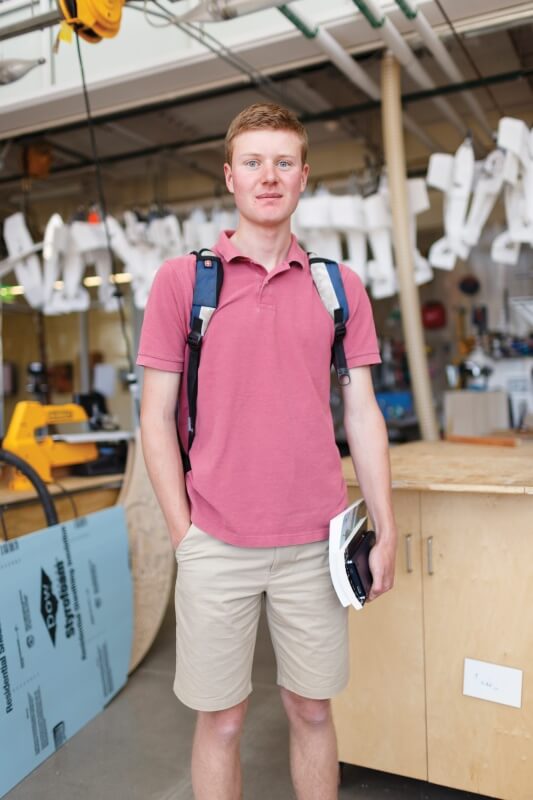The wonder in Nick Bain’s eyes as he looks into the distance while describing his latest experiment is matched only by the tone of his voice. “I was just sort of curious,” he says, formulating the words deliberately. “School is something you do constantly. It seems like it should be important for it to be done really, really well.”
Nick sits in a classroom in the Colorado Academy Upper School, and he says he was in the same seat when he couldn’t help questioning whether school was being done well. “Maybe it was,” he admits. “But I wasn’t sure. I wanted to see.”
So Nick started doing something simple: He began recording how he spent his time at school every 15 minutes. Over a seven-hour school day, Nick learned something surprising: He actively engaged in less than three hours of instruction.
“So I asked myself: What if instead of somebody telling you to do something, you just did it yourself?”
In essence, Nick was pondering the effectiveness of self-directed learning, a process in which students are empowered to assess and fulfill their own learning needs. It’s something he had thought about while watching lectures from the online school, Khan Academy, created by MIT grad Salman Khan, which grants free access to world-class education on a variety of subjects. The idea came full circle in his “Global Perspectives” course, taught by Upper School teacher Paul Kim, when students were tasked with generating ideas about education reform.
“I remember distinctly that the last day of school did not at all feel like the last day of school,” he says. “It just felt like any other day, because nothing really stopped. I realized that I could keep learning.”
“In the process, Nick and I began a series of ‘what if?’ conversations to explore his ideas,” says Kim. “And this resulted in his ‘independent experiment.’” Soon after, Nick pitched the idea to administrators, who agreed to allow the then-junior to study outside of the classroom.
It worked like this: In the third trimester of his junior year, Nick would spend his days learning on his own, studying a range of courses beyond the norm. He particularly liked poring over the Age of Exploration at the Denver Library, reading the diaries of Ferdinand Magellan and Christopher Columbus. For his Advanced French class, he dived into Jules Verne’s Around the World in 80 Days. Throughout the process, Nick took the same tests as other students, but was graded on a pass/fail basis to create more freedom for his studies.
Another requirement? Nick would have to keep a journal where he would reflect upon his learning experiences. The marble composition notebook sits beside the now-senior, well worn from constant use. Inside its pages are listed some of the benefits of self-directed learning: the ability to organize your own workload, to become engrossed in a subject, propelled by your own intrinsic motivation and to have ownership over your own education. Alternatively, he found that this freedom didn’t necessarily make learning more efficient. “I would work sort of ridiculously hard,” he says, “sometimes up to 18 hours a day,” leaving little time for other endeavors.
In his spare time, Nick works on what he hopes will one day become a battery-powered airplane, biking up and down his street with the model, and testing the drag, making small adjustments here and there. Along with classmate David Schurman, Nick also received Colorado Academy’s prestigious Jennifer Wu Memorial Fellowship, which provides funds for a summer project. He used the fellowship to work at the National Center for Atmospheric Research, studying Marine Cloud Brightening, a process of brightening clouds in order to deflect light away from the ocean and possibly mitigate climate change. Of course, all of this follows the success of his Kickstarter campaign, where he became the youngest person to launch a product using the crowdfunding site: his Switch Port, a dry-erase light switch cover, which he designed and produced using CA’s Innovation Lab.
Of all the benefits Nick found from his independent experiment, he stumbled upon one surprising realization: the value of diversity in a well-rounded education. “When you’re teaching yourself, you inevitably only learn stuff that you agree with,” he says. “You’re not necessarily forced to consider things that are different.”
On that note, he made another observation. Nick began to understand the value of teachers as the curators of quality content. “They can find things that you might not have been able to find, that are good,” he says. He adds that collaboration is another aspect of school that he missed. “It’s nice to see what other ideas people have. You also learn so much when you teach your ideas to others.”

